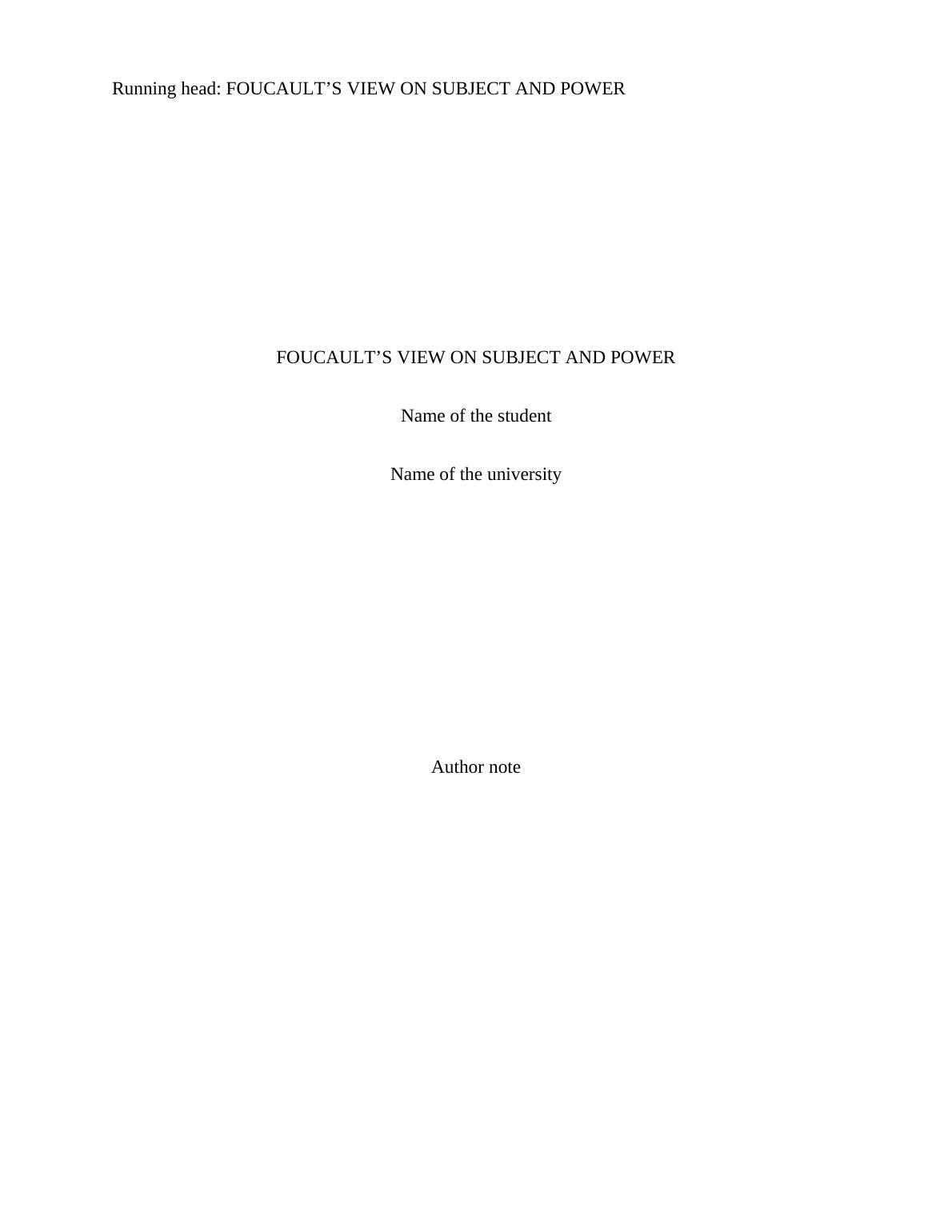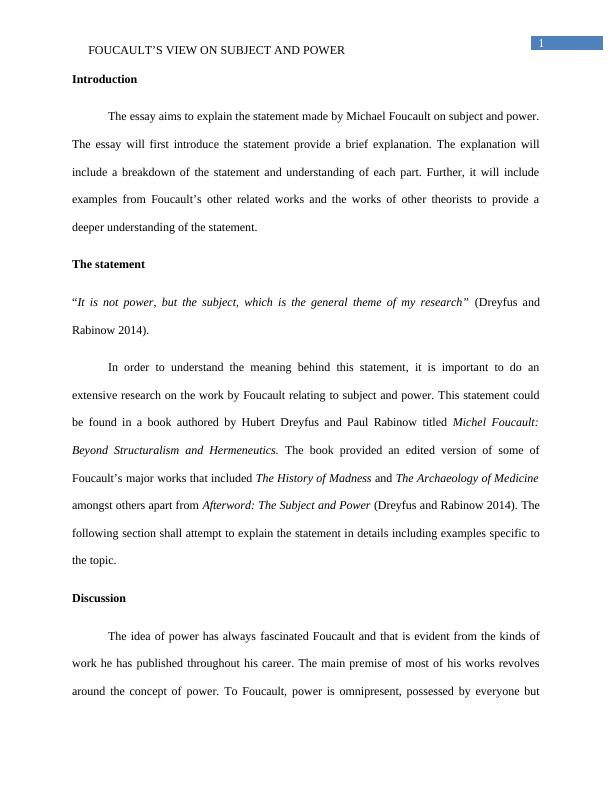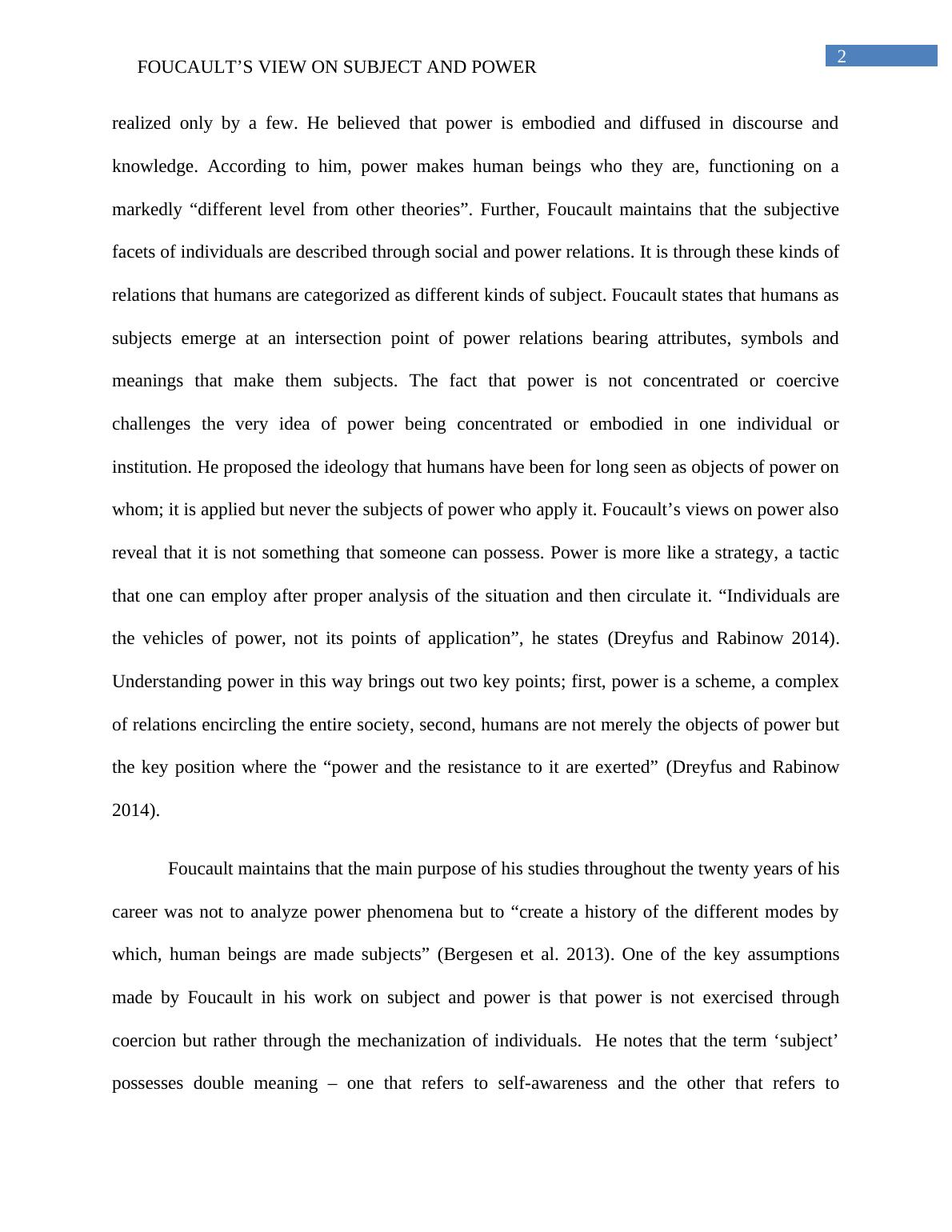Analysis of Foucault's Views (pdf)
Added on 2021-04-17
10 Pages2678 Words312 Views
Running head: FOUCAULT’S VIEW ON SUBJECT AND POWERFOUCAULT’S VIEW ON SUBJECT AND POWERName of the studentName of the universityAuthor note

1FOUCAULT’S VIEW ON SUBJECT AND POWERIntroductionThe essay aims to explain the statement made by Michael Foucault on subject and power.The essay will first introduce the statement provide a brief explanation. The explanation willinclude a breakdown of the statement and understanding of each part. Further, it will includeexamples from Foucault’s other related works and the works of other theorists to provide adeeper understanding of the statement.The statement“It is not power, but the subject, which is the general theme of my research” (Dreyfus andRabinow 2014). In order to understand the meaning behind this statement, it is important to do anextensive research on the work by Foucault relating to subject and power. This statement couldbe found in a book authored by Hubert Dreyfus and Paul Rabinow titled Michel Foucault:Beyond Structuralism and Hermeneutics. The book provided an edited version of some ofFoucault’s major works that included The History of Madness and The Archaeology of Medicineamongst others apart from Afterword: The Subject and Power (Dreyfus and Rabinow 2014). Thefollowing section shall attempt to explain the statement in details including examples specific tothe topic. DiscussionThe idea of power has always fascinated Foucault and that is evident from the kinds ofwork he has published throughout his career. The main premise of most of his works revolvesaround the concept of power. To Foucault, power is omnipresent, possessed by everyone but

2FOUCAULT’S VIEW ON SUBJECT AND POWERrealized only by a few. He believed that power is embodied and diffused in discourse andknowledge. According to him, power makes human beings who they are, functioning on amarkedly “different level from other theories”. Further, Foucault maintains that the subjectivefacets of individuals are described through social and power relations. It is through these kinds ofrelations that humans are categorized as different kinds of subject. Foucault states that humans assubjects emerge at an intersection point of power relations bearing attributes, symbols andmeanings that make them subjects. The fact that power is not concentrated or coercivechallenges the very idea of power being concentrated or embodied in one individual orinstitution. He proposed the ideology that humans have been for long seen as objects of power onwhom; it is applied but never the subjects of power who apply it. Foucault’s views on power alsoreveal that it is not something that someone can possess. Power is more like a strategy, a tacticthat one can employ after proper analysis of the situation and then circulate it. “Individuals arethe vehicles of power, not its points of application”, he states (Dreyfus and Rabinow 2014).Understanding power in this way brings out two key points; first, power is a scheme, a complexof relations encircling the entire society, second, humans are not merely the objects of power butthe key position where the “power and the resistance to it are exerted” (Dreyfus and Rabinow2014). Foucault maintains that the main purpose of his studies throughout the twenty years of hiscareer was not to analyze power phenomena but to “create a history of the different modes bywhich, human beings are made subjects” (Bergesen et al. 2013). One of the key assumptionsmade by Foucault in his work on subject and power is that power is not exercised throughcoercion but rather through the mechanization of individuals. He notes that the term ‘subject’possesses double meaning – one that refers to self-awareness and the other that refers to

End of preview
Want to access all the pages? Upload your documents or become a member.
Related Documents
Social Theory of Foucaultlg...
|6
|1679
|96
Michel Foucault’s concept of biopower, its operation and usefulnesslg...
|5
|1375
|380
Defining Discourse Assignmentlg...
|5
|1013
|116
Sociology : Social Media and Panopticonlg...
|8
|2230
|31
Christian Trinity: A Constructive Christian Theologylg...
|5
|866
|112
Critical Legal Theory : Introductionlg...
|11
|2896
|228
